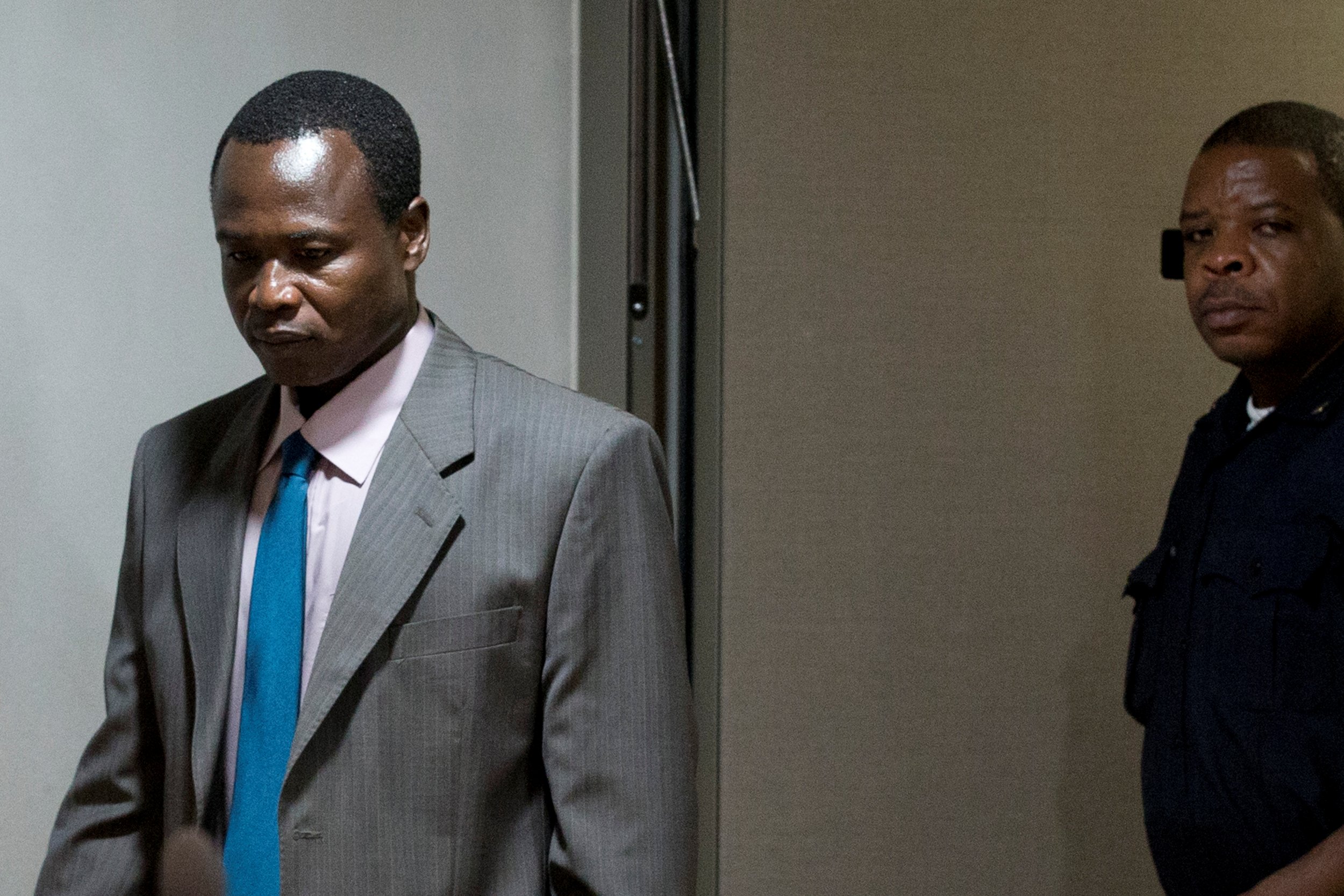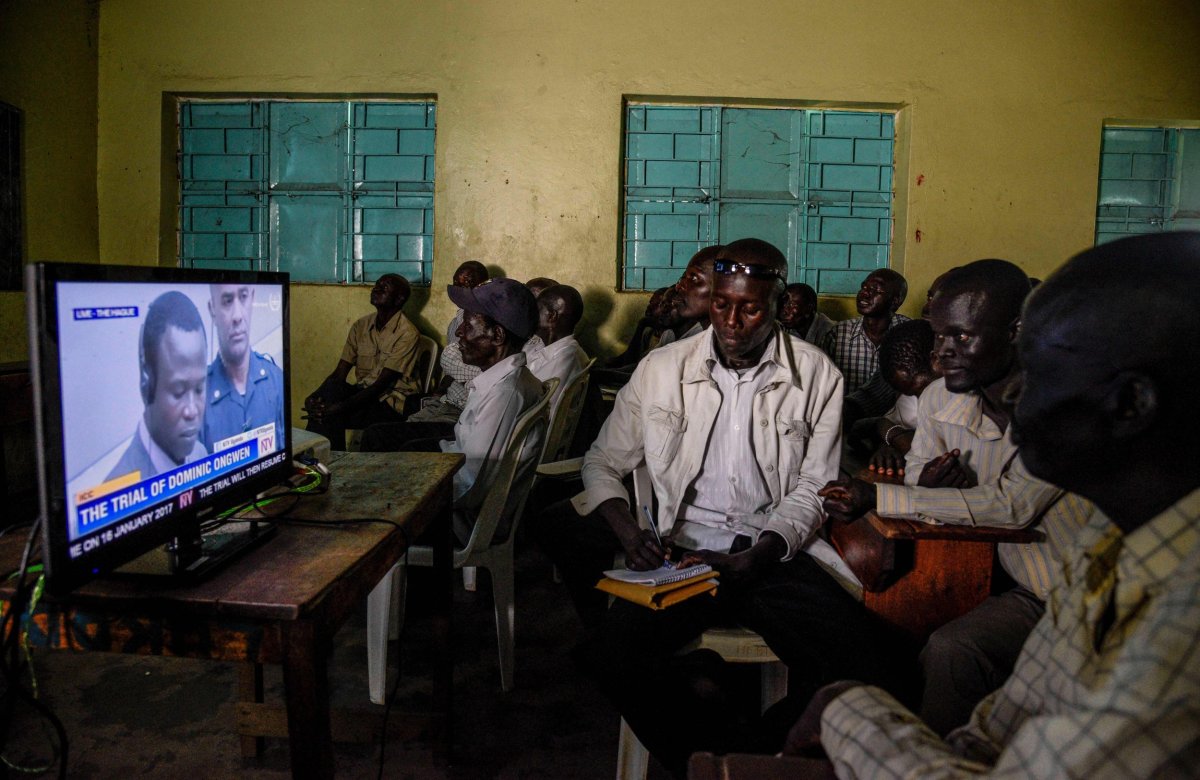
Dressed in a grey suit, light pink shirt and blue tie, Dominic Ongwen responded with a despairing plea when asked by judges at the International Criminal Court (ICC) whether he plead guilty to any of the 70 counts of war crimes and crimes against humanity.
"This [trial] amounts to my going back into the bush for the second time...Do you agree that my life was not ruined?" Ongwen, a former commander in the Lord's Resistance Army (LRA), a Ugandan militant group, asked the court on Tuesday before he was cut short.
Ongwen's opening plea cuts to the heart of a case that has several firsts at the ICC. The Ugandan, who is in his early 40s, became the youngest person to be indicted by the ICC in 2005. He is the first LRA member to be charged by the court. And, crucially, Ongwen is the first former child soldier to be brought before the court—a status that his defense is relying upon as a mitigating factor in his grave crimes.
Born in the northern Ugandan village of Coorom in the Amuru district, Ongwen maintains that, like thousands of other Ugandans, he too is a victim of the LRA. The militant group, founded by Joseph Kony and active since 1986, initially claimed to want to install biblical rule based on the Ten Commandments in Uganda but appears to be largely a personality cult focused around Kony. During three decades of conflict, the LRA has abducted tens of thousands of children and forced them into its ranks, and displaced almost 2 million people across northern Uganda, according to the U.S. State Department.

One of the children abducted by the LRA was Ongwen himself, reportedly at the age of 10. Ongwen rose quickly through the ranks of the movement and became a brigadier by his late 20s, meaning he was one of just a handful of fighters close to Kony, who remains at large. Within the movement, Ongwen was known as the White Ant—his surname translates as "born at the time of the white ant."
The charges Ongwen faces center mostly around attacks on camps for internally displaced persons (IDPs) in northern Uganda—specifically in Lukodi, Pajule, Odek and Abok—that took place between October 2003 and June 2004. Ongwen faces allegations of a litany of crimes committed in the attacks—including murder, rape, sexual slavery, recruitment of children under the age of 15 into the group, and forced marriage.
The United States joined the hunt for LRA commanders in recent years, issuing a $5 million reward for information leading to Ongwen's capture in 2013. The group is now believed to have dwindled to no more than several hundred fighters, but it is still capable of regular and deadly attacks. It has carried out almost 200 attacks in 2016 across Central African Republic (CAR), Democratic Republic of Congo and South Sudan, killing 22 civilians and abducting more than 600, according to the LRA Crisis Tracker. Ongwen was reportedly captured by members of the Séléka, a mainly Muslim rebel group in CAR, and handed over to U.S. forces.
While the list of Ongwen's alleged crimes is long, the list of victims is longer. More than 4,100 victims are participating in the Ongwen case via proxy lawyers. Others are following the trial via six viewing points set up in remote parts of northern Uganda and two in the Ugandan capital Kampala.
The ICC's chief prosecutor, Fatou Bensouda, said in court Tuesday that while Ongwen had indeed suffered through his recruitment to the LRA, that did not excuse the gravity of his crimes. "This trial is about violence and misery that blighted the lives of millions of people living in northern Uganda," said Bensouda in her opening statement. "We are not here to deny that he was a victim in his youth. We will prove what he did, what he said and the impacts of those deeds on the many victims."
Uncommon Knowledge
Newsweek is committed to challenging conventional wisdom and finding connections in the search for common ground.
Newsweek is committed to challenging conventional wisdom and finding connections in the search for common ground.
About the writer
Conor is a staff writer for Newsweek covering Africa, with a focus on Nigeria, security and conflict.
To read how Newsweek uses AI as a newsroom tool, Click here.








